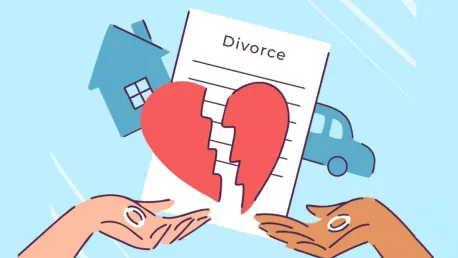Divorce poses numerous challenges, one of the most critical being the potential for severe credit damage due to jointly held mortgages. Thousands of divorcees in the US have received a stark warning about the financial pitfalls of joint mortgages, particularly when ex-spouses struggle to meet payment obligations despite family court orders.
Financial Consequences of Mortgage Arrears
For many individuals, the repercussions of an ex-partner’s failure to adhere to court-mandated mortgage payments can be devastating. A harrowing account from a divorcee in the Guardian illustrates this reality. Their ex-husband was ordered by the family court to manage mortgage payments while residing in their jointly owned home. However, the sluggish sale of the property and accumulated arrears led to significant financial turmoil for both parties. The divorcee experienced a substantial drop in their credit rating and faced the threat of house repossession. This predicament highlights the dire impact that a partner’s financial negligence can have on one’s credit score, complicating future financial endeavors such as securing new mortgages.
A reader suggested that maintaining vigilant oversight of shared financial commitments and communicating with mortgage lenders promptly can potentially mitigate these issues. Early action, seconded by many financial advisors, could allow for negotiating a repayment plan with lenders. By selling the house in negative equity and managing the debt in installments, individuals might circumvent the damaging process of repossession. Such proactive measures can help sustain a credit rating and preserve financial stability during difficult transitions.
Proactive Measures to Protect Credit Scores
Divorced individuals with joint financial commitments must prioritize proactive strategies to protect their credit scores. One recommendation is filing a notice of correction with the three major Credit Reference Agencies (CRAs). This documentation can reflect attempts to resolve the issue and provide evidence of efforts made to address the financial situation, potentially securing leniency from future lenders. Establishing clear communication with all parties involved, including mortgage lenders, can underscore the commitment to manage financial disputes responsibly.
Active vigilance over credit responsibilities can prevent severe long-term credit damage. It is paramount to monitor all joint financial accounts closely, ensuring payments are made timely. Legal documentation of efforts to manage financial disputes is crucial, as it can serve as tangible proof of proactive actions taken. Understandably, these measures can feel daunting, but they are essential steps to safeguard one’s financial future amidst the turmoil of divorce.
Importance of Early Intervention
Early intervention is critical in navigating the challenges posed by joint mortgages during divorce. Prompt communication with lenders when an ex-spouse falls into arrears can initiate alternative solutions before repossession becomes inevitable. Establishing a transparent line of communication with lenders can often lead to negotiated repayment plans, which may include selling the property at a loss but managing the residual debt in manageable installments.
Additionally, consulting legal and financial experts soon after the divorce can provide clarity and guide appropriate steps to mitigate risks. Legal advice can inform individuals of their rights and obligations regarding joint financial commitments, and financial consultants can offer tailored strategies to protect credit scores. Effective mediation between parties may also facilitate smoother financial transitions and prevent extended disputes that can further strain creditworthiness.
Legal Documentation and Credit Vigilance
Moreover, the importance of legal documentation cannot be overemphasized. Filing necessary notices, maintaining records of all communication with lenders, and documenting attempts to resolve financial disputes are essential actions divorced individuals should prioritize. These steps help in building a credible case when seeking leniency from lenders or disputing negative credit reports. Consistently updating CRAs with relevant information demonstrates a proactive approach to financial management.
Despite the emotional and financial stress divorce entails, maintaining strict vigilance over credit responsibilities is imperative. Regularly reviewing credit reports for inaccuracies and ensuring all obligations are met can aid in safeguarding one’s financial health. In disputed cases, providing written proof of efforts to manage debts responsibly can be a significant mitigating factor, possibly preventing further credit damage.
Navigating Financial Challenges Post-Divorce
Divorce comes with numerous complications, one of the most pressing being the risk of significant credit damage due to jointly held mortgages. In the US, thousands of individuals who have gone through a divorce have been alerted to the potential financial hazards linked to joint mortgages. This becomes particularly concerning when former spouses have difficulties in meeting their payment responsibilities, regardless of family court orders. Sometimes, even if one partner is ordered by the court to continue making mortgage payments, their failure to do so can negatively impact the credit scores of both parties involved. This ongoing issue highlights the importance of addressing joint financial obligations during and after the divorce process. Without careful management, a divorce can lead to long-lasting financial consequences, exacerbating an already emotional and challenging situation.









